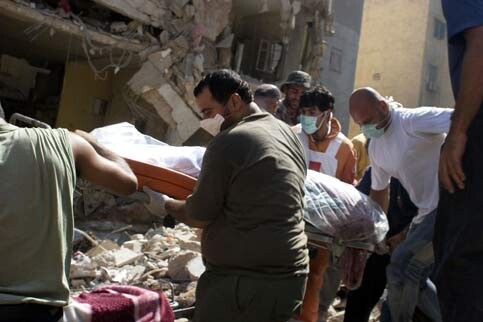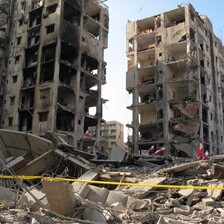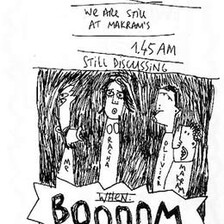Beirut 12 August 2006

Lebanese rescue workers search through the rubble for survivors after an Israeli air strike in the Shiyah district in south Beirut in which 31 persons were killed, 8 August 2006. (MaanImages/Raoul Kramer)
Whenever the electricity shuts off, I have the urge to write. For some reason, vowels seem more voluptuous under the soft diffuse of a burning wick. Candlelight works as a kind of aphrodisiac, luring me to my computer.
In apartments, houses and displaced centers across Lebanon, when the electricity ration is up, we automatically light the candles that we had previously laid out around the house. In my house, there is a clear pattern; one in the foyer, one in the bathroom, two in the living room (one set high on a bookshelf, the other low on a coffee table). Another candle stays close by, unlit. This is the candle we travel to the other areas of the house with. Increasingly, we light our candles as we finish a sentence, finish a drink, or bring a peanut to our mouths. We move from light to darkness to candles without a pause.
These days, it is getting more difficult to find and buy candles in Beirut.
Before yesterday, an Israeli missile slammed into an old, unused lighthouse in Beirut, near the Lebanese American University. Debris from the attack found its way to my father’s office building. Inside it was my father. When he left his office, he found a paper on the ground that warned him that he was in danger, and it was due to Hezbollah’s, not Israel’s, rockets.
All over Beirut papers fluttered down to the streets, arriving in pieces sometimes (like snowflakes, Ahmad said) - perhaps exhausted from their long journey to the ground from the heights of an Israeli warplane. As the papers neared the streets cars stopped, bodies stooped, and people read. In Achrafieh, where my sister lives, I had the pleasure of being educated via paper that Beirut and its residents were not immune from Israel’s bombs, that the city is not protected in Israeli repellant bubble wrap (other wise known as “diplomatic red lines”).
Apparently, the fact that there was an Israeli warplane hovering over Beirut at that very moment was not violating enough. It also had to announce, in writing, that soon it would be releasing messages of the more explosive, murderous kind. And that there was nothing that we could do about it.
The irony, of course, is that Israel has already been bombing Beirut. Two weeks ago an Israeli warship fired at a construction site in Achrafieh. Three weeks ago Beirut’s working lighthouse - a highlight of the pedestrian choked corniche - was bombed. But apparently, all of this was merely an exercise in “symbolic” bombing. By symbolic, I mean that the bombs were, and are, being used merely to underscore the warning printed on the paper. Together the bombs and the papers convey a unified message: that Beirut will be bombed at the time and place of Israel’s choosing - just like the part of Lebanon that lies just south of it. Just in case someone forgot (or began to think that Israel is not bombing Beirut out of fear of Hezbollah’s long(er) range missiles), we are being kindly reminded that Beirut is at the mercy of the almighty Israeli Defense Forces.
That is how cheaply Arab blood is traded on the global (media and political) market. All over Lebanon, it is spilled merely to prove a point. Increasingly, the Israelis do not try to cover up their crimes with talk of “strategic objectives.” Increasingly, the world does not ask for such explanations.
That is how cheaply Arab blood is traded on the global (media and political) market. All over Lebanon, it is spilled merely to prove a point. Increasingly, the Israelis do not try to cover up their crimes with talk of “strategic objectives.” Increasingly, the world does not ask for such explanations.
For four weeks now, the city has been shrinking around us. In Beirut, we are beginning to feel caged. Aside from these incidents of “symbolic bombing,” Israel has also attacked areas that used to be considered, if not Beirut, then at least “Greater Beirut.” What used to be within the conceptual map of the city is now a lonely neighborhood, the city lines being (re)drawn just at its charred black border. Clearly, this has happened to Ouza’i, the residential area clustered around a wide street that was the old road to the South of the country. Ouza’i is the closest southern suburb to Beirut, and in fact it begins at the exact point where the city line of Beirut ends. Six summers ago, I walked across that line every day to buy a pack of cigarettes. The distance from the store in Ouza’i to my friends house in Jnah (on the other side of the Beirut-Greater Beirut line) was less than 20 meters.
But I can understand the confusion and the adamant claim made by Israel, the US, and even the Lebanese government that Beirut has not (yet) been bombed, despite the fact that all of southern “Greater Beirut” has.
After all, there is no American University in Ouza’i or the remaining southern suburbs (that all have names, by the way-names like Haret Hreik, Chiah, Hayy el Sulloum, Bir Hassan), Saudi Arabian nationals do not own the majority of its land and its residents cannot produce Ottoman era documents proving their innate Beiruti-ness.
Instead, the residents of Ouza’i are largely refugees from another, but eerily similar, history of violence, circa 1978 and 1982. And, in lieu of revamping or rebuilding it Solidere style, the Lebanese government built a highway over it so that tourists and Lebanese from a different socio-economic class could travel from the airport to their homes and hotels in the city without having to be reminded that “their city” was only half of the story. By consensus of the “popular,” Ouza’i was an eyesore, and it was excised through infrastructure.
And today, Ouza’i is considered just one more bombed out southern suburb of Beirut, the capital city of Lebanon - that grand meeting point between East and West (in case you didn’t guess what that exactly meeting point is, it is not the shared love of democracy, freedom or human rights, it’s the shared primary love of the free market economy and the US dollar) that Israel has not yet bombed. The fact that this “Switzerland of the Middle East” has not (yet) been targeted is offered as proof to the world that Israel is showing restraint, that it really wants peace, that it is a friend to some Lebanese people. The reasonable ones, of course.
Apparently, reasonable Lebanese do not have facial hair and do not veil. They are from the middle and upper classes, and do not display socialist, communist or Arab nationalist leanings. Most importantly, reasonable Lebanese do not annoy the governments of Israel and the United States with troublesome words like “justice”, “dignity”, “occupation”, and “resistance.”
And who are these reasonable Lebanese, these “friends” of Israel? Apparently, reasonable Lebanese do not have facial hair and do not veil. They are from the middle and upper classes, and do not display socialist, communist or Arab nationalist leanings. Most importantly, reasonable Lebanese do not annoy the governments of Israel and the United States with troublesome words like “justice”, “dignity”, “occupation”, and “resistance.” And that is why, more and more each day, if these “reasonable” Lebanese do exist, they exist mainly as an imagined community. The Lebanon that Israel imagines itself to be “friends” with is similarly a mirage-Israel’s own, personal Atlantis.
And even if there are a few “reasonable” Lebanese walking around (and I have no doubt that there are) they are deeply closeted. The price of coming out is too high, especially as the Lebanese civilian casualty rate exceeds 1,100, of which more than a third are children.
Every day, this number grows with the discovery of new dead bodies, quietly rotting under the debris of their homes.
Writing this at my house in Mazra’a in candlelight again, I wonder how much more the city can shrink - which part of Greater, or even Central Beirut will be forced to secede next. Where will the Israeli warplanes drop their papers, forcing us to stand witness to our own helplessness before their cheaply printed, blood soaked propaganda? Where will we be asked to evacuate from tomorrow? Who will get a phone call tonight, answering to a recorded voice warning in accented Arabic, “Do you understand the path down which Hassan is leading you?” These phone calls always begin or end with the announcement “this is the State of Israel.” This audio signature is duplicitous and depressing. It taunts us with the knowledge that ultimately, our injuries, deaths, and losses will not be blamed on Israel’s indiscriminate, criminal violence, but on our own failure to be “reasonable.”
When will it finally be understood that Israel has been bombing, raiding, and terrorizing all of Lebanon and its residents without exception?
Actually, this last statement should be amended.
It should read: Israel has been bombing, raiding and terrorizing all of Lebanon and its residents without exception. However, the state of Israel has also been decimating, invading, depopulating and murdering Lebanon’s disadvantaged citizens and areas in greater numbers, massacre numbers in fact. Because in a word, Ouza’i is a (mainly) Shi’ite slum. And the Israelis, displaying not only their navigation of the logic of power in Lebanon but also of the logic of power in the world, know that they can target it, and places like it, with (more) impunity.
The residents of Ouza’i have also internalized this lesson. Many have fled their homes, even before Israel did the inevitable and attacked them. In the words of a ten year old boy living in a displaced center in Achrafieh (definitely considered Beirut, although parts of it are further in distance to the center of Beirut than Ouza’i is) I spoke with three weeks ago:
Ouza’i has become a city of ghosts.
Maya Mikdashi is a graduate student at Columbia University. She is also co-director of the award-winning documentary film About Baghdad.
Related Links





